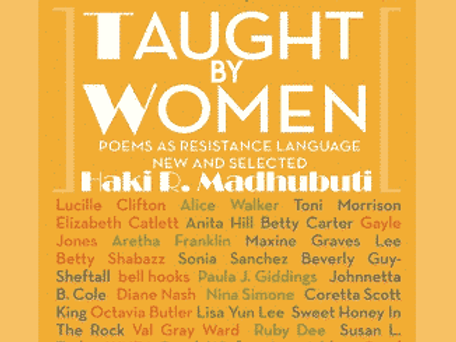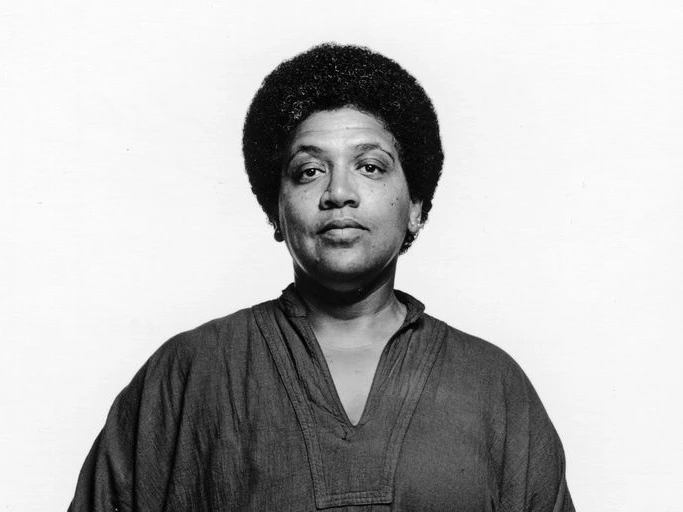Taught by Women: Poems as Resistance Language, New and Selected is a love letter, a Black valentine, by Haki R. Madhubuti to women of all stripes who have contributed positively to the social being that he is. If his emotional capacity is vibrant, they primarily shaped it. If his understanding is now vast, they are largely responsible. Haki’s appreciation takes the form of a captivating volume of poetry and prose that makes his adoration plain and displays his tribute as beautiful. Ironically, this involves a full reckoning with the grim and horrific. Haki explains that his book is his “acknowledgment and thank you to over half the world’s population who remain too often property, raped, honor killed, diminished, enslaved, lynched, dismissed, excluded, lied to, abused, sexualized, sex trafficked, devalued, demeaned, executed, imprisoned, forgotten, forced into unwanted marriages, miseducated, undereducated, beheaded and bodily disfigured.” There is still an artful statement to be made about this state of affairs. It just means that the art has to be anti-patriarchal, affirming, and real.
For Maxine
One of the energy centers in the work involves Haki’s mother, Helen Maxine Graves Lee. His reflections don’t start with her, but his journey does. She is the first of the teachers; the lessons of her own life are varied and hard. A physically beautiful woman, a great spirit, and a big dreamer, she is ensnared by her choices and her underside of sadness. The poet, though filled with love, is completely unsentimental in his analysis:
Jimmy Lee got the first hit, with his smile,
music, lies, sexual know-how and promises.
She ceased looking at other boys or men.
That was her first mistake.
Of course, it was not a mistake. She gave the world Don L. Lee, whom we know as Haki. Moreover, she encouraged him to pursue art and his talents. But readers will get why the tone is poignant when they grasp more of Maxine’s trapped life; her descent into prostitution, alcoholism and drugs; and her death at the age of thirty-four. She once was, Haki writes, “music unemployed.” She remained so. He reminisces at one point about bitter confrontations between him and several of her customers:
I was ready and willing to fight for Helen Maxine
Graves Lee—I was all she had.
And that was clearly not enough.
Saving people, if possible, is a difficult task. Really difficult if you are only sixteen years old yourself.
Haki’s poems about his mother are some of his best. He could write a brilliant biography in verse, extending beyond what he does here or in a previous volume, YellowBlack. Or maybe he gives her the primary voice and makes it a detailed poetic autobiography. In any case, I predict that we will hear more from or about Maxine. Her stamp has been that firm but her imprint not that settled.
For Gwendolyn
To know Haki even casually is to know of the great bond he shared with Gwendolyn Brooks. It makes for one of the great stories in American literature. A great Chicago story. His need abundant. Her embrace powerful. I became aware of the dynamic decades ago when I read her introduction to his third volume of poetry Don’t Cry, Scream. A subsection of Taught by Women, nine poems, focuses on Brooks. It follows a photograph of Brooks and Haki taken in the early 1970s when he was thirty or so and she was in her mid-fifties.
Pondering her achievement as a writer, Haki composes,
as in music,
as in griots singing,
as in language mastered, matured
beyond melodic roots.
With respect to her influence, he continues,
with the wind in your hand,
as in trumpeter blowing,
as in poet singing,
as in sister of the people, of the language,
smile at your work.
your harvest is coming in, bountifully.
Concerning their personal relationship, Haki makes his debt clear given Brooks’ contribution to his development. In “A Mother’s Poem,”
not often did we talk.
your large acts of kindness shaped memory,
your caring penetrated bone & blood
and permanently sculptured a descendant.
I speak of you in smiles
and seldom miss a moment
to thank you for
saving a son.
Continuing the Journey
The saved son has spent more than half a century being worthy of his blessings. His outlook and actions are represented throughout this summative collection. We distill from these pages the essence of Haki, the advice on marriage, parenting, study, politics, meditation, fasting, proper diet, and exercise. This manual for living includes musings on the role of artists, in Haki’s view the freest of people. Black Liberation is paramount. A meaningful life involves struggling for it. He speaks often of avoiding storms but also of weathering the storms one is caught in. And central to all his concerns are women: “as the women go, so go the people/determining mission/ determining possibilities.” Naturally, among his many affirmations are the poem “Safisha,” for his wife. He remarks on the growth of their relationship,
our joining into one proceeded like
sand through a needle’s eye.
slow, bursting for enlargement & uncertainty.
a smoothing of passion and ideas
into spirited permanence and love.
He closes with,
you bring dance & vision into our lives.
it is good & good
to be your
man.
Although a relatively small percentage of the work in Taught by Women is new, Haki does retain some of his old bite as he is “witness to a catastrophe,”
forty-five is the first president in modern politics to openly, brazenly
brag about / grab the pussy / and an in-your-face “fence them in”
disrespect and belittling of women, especially Black, Brown,
First Nation and Asian.
To complement his poetry, Haki includes an addendum containing six essays, one titled “On Becoming Anti-Rapist,” and five others that assess writers. The artists are Lucille Clifton, Sonia Sanchez, Toni Cade Bambara, Maya Angelou, and Ntozake Shange. After reading Taught by Women, we don’t suppose that the education of a questioner like Haki will ever be complete. But we do know that he has had some of the best instructors.





